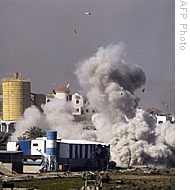Istanbul
27 October 2009
For more than a decade Turkey and Israel have enjoyed close military cooperation including joint naval exercises that have taken place since they signed a military cooperation agreement in 1996. But relations between the two countries have cooled since Ankara criticized Israel's offensive in the Hamas-ruled Gaza Strip in December and January. Most recently, Turkey postponed a joint air force drill after opposing Israel's participation.
 |
| A cloud of smoke billows from the Gaza Strip following an Israeli strikes as seen from the Israel-Gaza border, 15 Jan 2009 |
The growing strains stem largely from Ankara's increasing criticism of Israel's occupation of Palestinian territory, and more recently, Ankara' canceled joint military exercises with Israel scheduled for later this month.
Suat Kiniklioglu, spokesman for the Turkish parliamentary committee on foreign affairs, explains.
"Turkish public opinion could not agree with the fact that an Israeli aircraft would be training on Turkish territory, while at the same time there are gross human rights violation being committed in Gaza," he said. "I think one needs to recognize - given the current state of relations - it is difficult to describe it as a strategic one anymore. It is a relationship that maybe was strategic in the past, but its probably downgraded to a more ordinary bilateral relationship."
The tensions have imperiled a strategic alliance forged in 1996 that cemented military and intelligence ties.
In January, Turkish Prime Minister Tayyip Erdogan publicly criticized Israel over the Gaza campaign and walked out of a session of the World Economic Forum in Switzerland attended by Israeli President Shimon Peres.
Mr. Erdogan accused Israel of "barbarian acts" during the 22-day Gaza incursion, which Israel launched in response to a wave of deadly rocket attacks from Palestinian territory. Some 1,400 Palestinians, most of them civilians, were killed by Israeli forces during the Gaza operation.
Experts say Turkey's tough stance is causing concern both in the United States and Europe.
US Congressman Robert Wexler, a self-described friend of Turkey, attacked the Turkish prime minister of double standards.
"Where's the outrage when the prime minister talks about no tolerance for terror?" he asked. "The terror in this region is created by Hezbollah in Lebanon and Hamas in Gaza. Where was the outrage for years as there was strikes against civilian targets in Israel?"
But on the streets of Istanbul there is widespread support for the government's stance towards Israel. This man's view is typical.
He says, too much blood is being shed, and many innocent people are being killed, most of whom are Palestinians. The Israelis are responsible for this. It's wrong that Turkey has close relations with the Israeli government and army, which is responsible for these deaths. This really disturbs me, he says.
The 1996 alliance between Israel and Turkey, made Ankara Israel's closest friend in the Muslim world.
Soli Ozel of Istanbul's Bilgi University said the alliance, one of the most significant in the Middle East, stemmed from a recognition of mutual security interests. Both countries were isolated regionally and at that time shared common foes, Syria in particular.
"Turkey was fighting a war against an insurrectionary movement whose leader was sitting in Syria," he explained. "And the relation with Israel within two years allowed Turkey to tell the Syrians you either kick him out or we will come in there to pick him up and it worked."
But change began when the Islamist-rooted AKP Party was elected to power in 2002.
Earlier this month Syria and Turkey signed what is being described as an historic agreement, which allows visa-free travel between the two countries. Preparations are also under way for a joint military exercise between the two. No plans are scheduled for any future such cooperation with Israel.
Turkish parliamentary committee on foreign affairs spokesman Kiniklioglu says he expects little improvement in relations with Israel.
"If the current posture of the Israeli government on Gaza continues it would not be difficult to predict that Turkish and Israeli relations will continue to be difficult and fragile," he noted. "So I think we need to brace ourselves for a new period."
Analysts say the once political and militarily strategic alliance between Turkey and Israel was the most powerful alliance in the region. But for now at least those days seem over. With Ankara working hard to improve relations with Syria, Iraq and even the prime minister's visit to Tehran, few people see little chance of a renewal of that alliance anytime soon.